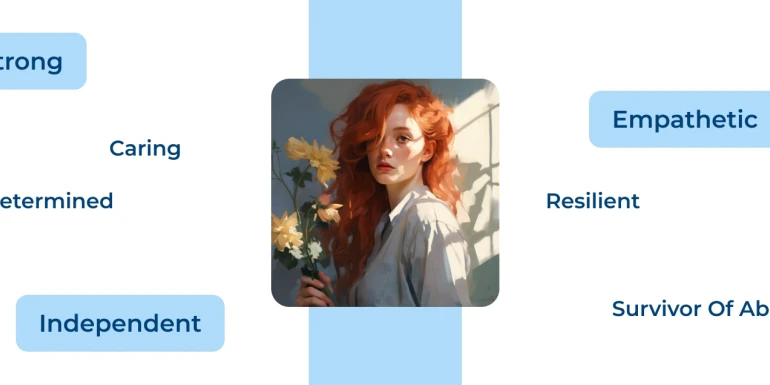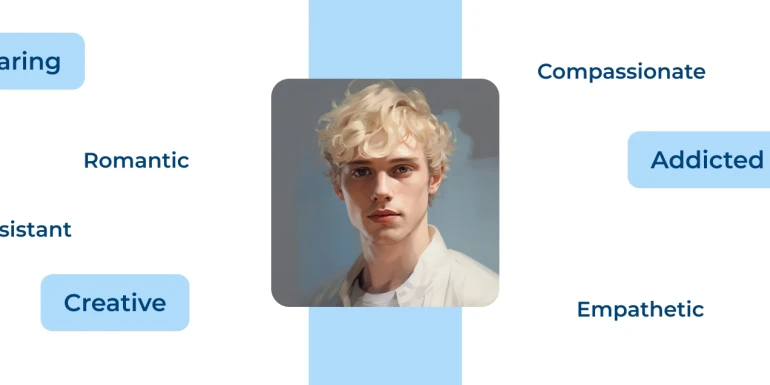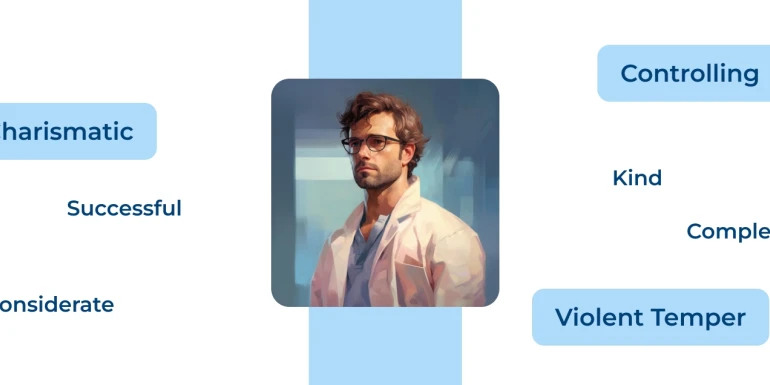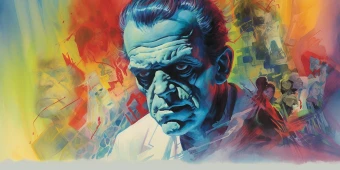by Colleen Hoover


It Ends with Us: Characters
Table of contents
- Lily Bloom
- Atlas Corrigan
- Ryle Kincaid
- Allysa
- Jenny Bloom
- Andrew Bloom
- Ellen DeGeneres
- Marshall
- Emerson (Ryle and Allysa's brother)
- Lucy
- Devin
- Katie
- Brad
Lily Bloom

Lily Bloom, the protagonist of Colleen Hoover's novel "It Ends With Us," is a complex and dynamic character who undergoes significant personal growth throughout the story. Initially, she is portrayed as a strong and independent woman who runs her own business and is determined to succeed. However, as the novel progresses, her strength is tested as she confronts her painful past and struggles to make difficult choices.
One of Lily's defining characteristics is her empathy and compassion. From a young age, she is shown to care deeply about others, especially those who are vulnerable or disadvantaged. This is evident in her relationship with her mother, who has suffered from domestic abuse, and in her work as a nurse, where she is often the only source of comfort and support for her patients. Her compassion is also shown in her relationships with Ryle and Atlas, as she tries to understand and help both of them despite their flaws.
At the same time, Lily also has a strong sense of independence and self-preservation. She is not willing to compromise her own values or well-being for the sake of others, and this is exemplified in her decision to leave her abusive father and to end her relationship with Ryle when she realizes that he is not capable of changing his behavior. However, her independence also leads her to make choices that are not always in her best interest, such as when she pushes Atlas away because she is afraid of being hurt again.
Throughout the novel, Lily grapples with the legacy of her father's abuse and its impact on her relationships with men. She is torn between her love for Ryle and her fear of repeating the cycle of abuse, and this conflict drives much of the novel's tension. As she begins to understand the complexities of domestic abuse and the psychological toll it takes on victims and abusers alike, she becomes more introspective and reflective, grappling with her own biases and limitations. Ultimately, her decision to break the cycle of abuse and to end her relationship with Ryle is a testament to her strength and courage.
Another notable aspect of Lily's character is her growth over the course of the novel. She begins the story as a confident and self-assured young woman, but as she confronts the trauma of her past and the challenges of her present, she becomes more vulnerable and introspective. Her decision to open up to Atlas about her past and her fears is a turning point in her character arc, as it marks a shift towards greater emotional maturity and self-awareness. By the end of the novel, Lily is no longer the same person she was at the beginning, and her growth is a testament to her resilience and determination.
Overall, Lily Bloom from It Ends With Us is a complex and multifaceted character who defies easy categorization. She is a woman of great strength and compassion, but also of vulnerability and fear. Her journey through the novel is one of self-discovery and personal growth, as she confronts the trauma of her past and grapples with the challenges of her present. Ultimately, her decision to break the cycle of abuse and to choose her own happiness is a testament to her strength, resilience, and unwavering spirit.
Atlas Corrigan

In Colleen Hoover's novel "It Ends With Us", Atlas Corrigan is one of the main characters. He is introduced to the reader as the first love of Lily Bloom, the protagonist. Atlas is described as a handsome and charming young man with a tragic past. Throughout the novel, his character undergoes significant development and the reader gets to see different facets of his personality.
One of the most notable things about Atlas is his resilience. He comes from a difficult background, having grown up in foster care after his mother's death. Despite this, he manages to become a successful artist and build a new life for himself. He is also very supportive of Lily, and their connection runs deep due to their shared experiences. Despite the time that has passed since they last saw each other, he still cares for her deeply and wants to protect her from harm.
Atlas is also portrayed as a compassionate and caring person. He shows this side of his personality when he helps Lily take care of her father, who is suffering from Alzheimer's disease. He is patient and kind with him, which highlights his empathetic nature. Moreover, Atlas is very supportive of Lily's dreams and ambitions. He encourages her to pursue her goals and provides her with emotional support when she needs it.
Another aspect of Atlas' character is his artistic side. He is an accomplished artist who creates beautiful and thought-provoking paintings. His art is a reflection of his own experiences and emotions, and he often uses it to express his feelings. Lily is drawn to his art and appreciates the way that it speaks to her on a deep level.
However, Atlas also has a dark side. He struggles with addiction and is unable to overcome it on his own. This puts a strain on his relationship with Lily, as she tries to support him while also dealing with her own problems. His addiction leads to a series of events that threaten their relationship and force Lily to make difficult choices.
Overall, Atlas is a complex and multifaceted character. He is resilient, compassionate, and supportive, but also struggles with addiction and has a troubled past. His character serves as a reminder that people are not defined by their past experiences and that they can overcome even the most difficult of circumstances.
Ryle Kincaid

Ryle Kincaid is one of the main characters in Colleen Hoover's novel "It Ends With Us". He is a successful neurosurgeon, handsome and charming, and seems to have everything going for him. However, as the story progresses, we see a darker side to Ryle's character.
At first, Ryle seems to be the perfect man for Lily Bloom. He is kind, considerate, and supportive of her dreams. He is also successful in his career and has a charismatic personality. However, as Lily gets to know Ryle better, she discovers that he has a dark side to him. Ryle has a violent temper, which he blames on his upbringing and past experiences. He admits to having been physically abusive to a past girlfriend, and Lily is shocked and disturbed by this revelation.
Ryle's violent tendencies are a result of his past trauma, which is revealed to the reader through his own personal reflections and conversations with Lily. He has a complex relationship with his father, who was abusive to him and his mother. Ryle's experiences have made him believe that violence is a necessary means of self-preservation, and he struggles to control his temper when he feels threatened.
Throughout the novel, Ryle's character is developed through his interactions with Lily and the other characters. As Lily begins to fall in love with Ryle, she becomes more and more conflicted about his past and his temper. She wants to believe that he has changed and will never hurt her, but she is also aware of the risks of staying in a relationship with someone who has a history of violence.
Ryle's character arc in the novel is one of self-discovery and growth. As he becomes more aware of the impact of his actions on others, he begins to take steps to control his temper and become a better person. He seeks help from a therapist, and he opens up to Lily about his struggles with anger management. He also takes steps to make amends with his ex-girlfriend and repair the damage he caused in their relationship.
Overall, Ryle Kincaid is a complex character who struggles with his past trauma and the impact it has had on his personality. While he initially seems like the perfect man for Lily, his violent tendencies make it difficult for her to trust him. Through his growth and self-reflection, he is able to acknowledge his flaws and work towards becoming a better person.
Allysa
Allysa is a minor character in "It Ends With Us" by Colleen Hoover, She plays a significant role in Lily Bloom's life. She is Lily's best friend since childhood and is portrayed as a supportive and caring friend throughout the story.
Allysa's character is introduced early in the novel as Lily's closest friend, who is always there for her in times of need. She is shown to be a calming presence in Lily's life, helping her deal with the stress of running her business and supporting her emotionally through the ups and downs of her relationship with Ryle. Allysa also encourages Lily to pursue her dreams and stands by her when she makes the difficult decision to end things with Ryle.
One of the most notable qualities of Allysa's character is her loyalty to Lily. Even when she disagrees with Lily's decisions, she always supports her and tries to understand where she is coming from. This is evident when Lily confesses to Allysa about her complicated relationship with Ryle and how she is struggling with her feelings for him. Despite not agreeing with Lily's decision to continue seeing Ryle, Allysa remains a supportive friend and listens to Lily's concerns.
Another significant aspect of Allysa's character is her role as a voice of reason. She provides a grounded perspective to Lily's impulsive nature, helping her think through her decisions logically. This is exemplified when Lily is torn between Ryle and Atlas, and Allysa reminds her to think about what she wants and what will make her happy in the long run.
Allysa's character also serves as a foil to Lily's mother, who struggles with addiction throughout the story. While Lily's mother is unable to provide the support and stability that Lily needs, Allysa is always there for her friend, offering a listening ear and a shoulder to lean on.
In summary, Allysa's character is portrayed as a loyal, supportive, and level-headed friend. She is a calming presence in Lily's life, offering her emotional support and helping her make difficult decisions. Her character provides a stark contrast to Lily's unstable home life, highlighting the importance of strong friendships in times of need.
Jenny Bloom
Jenny Bloom is a significant character in the novel "It Ends With Us" by Colleen Hoover. She is Lily's mother, and her past experiences have heavily influenced her character and behavior.
Jenny's character is portrayed as a victim of domestic abuse who has struggled to leave her abusive husband. Her inability to leave her husband resulted in Lily and her sister, Alyssa, being exposed to their father's violent behavior. Despite this, Jenny is a caring mother who tries to protect her children from their father's anger. However, her constant denial of the abuse that was happening in front of her eyes is a testament to her lack of courage and willingness to change her situation.
Jenny's character is also shown to be hypocritical. She is a feminist and promotes women's rights, but she is not willing to stand up for herself and is instead willing to endure abuse to maintain her lifestyle. This makes it difficult for Lily to understand her mother's decisions, as she struggles to reconcile Jenny's feminist beliefs with her inaction in her own life.
Jenny's character evolves throughout the novel as Lily begins to understand her mother's past experiences and the reasons behind her choices. Jenny's history with her own abusive father and her mother's death led her to believe that she was not capable of surviving on her own. Her relationship with her husband was an attempt to escape the problems in her past, but ultimately, it resulted in her being trapped in another abusive situation.
In the latter part of the novel, Jenny's character is portrayed as someone who is willing to fight for her life and her children's safety. She finally finds the courage to leave her husband and start a new life for herself and her family. This shows that Jenny's character is not just a victim, but also someone who is capable of change and growth.
Overall, Jenny's character is an important element of the novel. Her experiences with abuse and her struggle to leave her abuser serves as a cautionary tale and highlights the importance of self-worth and standing up for oneself. Her character's evolution also shows the power of love and support from family and friends in helping individuals break free from abusive situations.
Andrew Bloom
Andrew Bloom is a minor character in "It Ends With Us" who plays a pivotal role in the development of Lily's character. He is Lily's father who had an abusive relationship with her mother, causing Lily to experience domestic violence as a child. Despite this, Andrew tries to maintain a relationship with Lily as an adult and reaches out to her after the death of her father.
Andrew's character represents the cycle of abuse that Lily has witnessed and experienced in her life. His attempts to reconcile with Lily highlight the importance of forgiveness and moving on from past trauma. However, Lily's hesitance to fully forgive him shows the complexity of the effects of abuse and the difficulty of breaking the cycle.
Overall, Andrew's character serves as a reminder of the long-lasting effects of domestic violence on families and the importance of seeking help and breaking the cycle of abuse.
Ellen DeGeneres
Ellen DeGeneres is a real-life celebrity who is mentioned briefly in the novel "It Ends With Us." She is portrayed as a symbol of hope and inspiration for Lily as she navigates through difficult times in her life. Lily watches Ellen's show on TV and is inspired by her message of spreading love and kindness in the world.
Ellen serves as a source of comfort and encouragement for Lily, who is struggling to find her own voice and make decisions that will impact her future. The brief mention of Ellen in the novel is significant in that it emphasizes the importance of having positive role models and sources of inspiration in our lives, even if they are not directly involved in our personal lives.
Ellen's message of spreading love and kindness aligns with the themes of the novel, particularly the idea of breaking the cycle of abuse and choosing to love and respect oneself. Her brief appearance in the novel adds to the overall message of hope and encourages readers to seek out sources of positivity and inspiration in their own lives.
Marshall
Marshall is a minor character in the novel "It Ends With Us". He is portrayed as an entitled and abusive man who tries to manipulate Lily into a relationship with him. Despite Lily's clear disinterest and discomfort, Marshall persists in pursuing her and becomes physically aggressive towards her. Marshall serves as a representation of the toxic and dangerous behavior that Lily has experienced in her past relationships, and his character highlights the importance of recognizing and rejecting abusive behavior.
Emerson (Ryle and Allysa's brother)
Emerson is portrayed as a caring and supportive sibling to Ryle and Allysa. Though he doesn't have a major role in the story, his presence adds depth to the family dynamics and shows the importance of familial support.
Lucy
Lucy is the daughter of Lily and Ryle in the novel "It Ends With Us". She is a symbol of their love and the hope for their future together. Throughout the novel, Lily's decisions revolve around what is best for Lucy, and she becomes a driving force for Lily's actions. Ultimately, the novel shows the impact of domestic violence on families and the importance of breaking the cycle for future generations. Lucy serves as a reminder of this message and the hope for a better future.
Devin
Devin is one of Lily's close friends in the novel "It Ends With Us". He is a gay artist who has been friends with Lily since college. He is supportive of her throughout the novel and provides her with a safe space to talk about her problems with Ryle. Despite his own struggles with love and relationships, Devin is a loyal friend and confidant to Lily.
Katie
Katie is a childhood friend of Lily's from her hometown in Maine. She appears briefly in the novel as Lily reflects on her memories of growing up in Maine and how Katie was one of the few people who understood her struggles with her father's abusive behavior. Despite losing touch over the years, Lily still thinks of Katie fondly and remembers the support she offered during difficult times.
Brad
Brad is the owner of the flower shop where Lily works. He is kind and supportive of Lily, and their friendly relationship grows over time. Brad provides a safe space for Lily to talk about her personal problems, and she appreciates his non-judgmental nature. Although he is a minor character in the novel, Brad's presence highlights the importance of having supportive friends in times of need.
Recommended for You

- Instructions Followed To The Letter
- Deadlines Met At Every Stage
- Unique And Plagiarism Free


 Othello
Othello
 The Odyssey
The Odyssey
 Frankenstein
Frankenstein